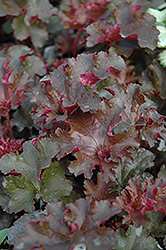Plant Height: 12 inches
Flower Height: 18 inches
Spacing: 15 inches
Sunlight:
![]()
![]()
![]()
Hardiness Zone: 3a
Other Names: Coralbells, Alumroot
Description:
Colorful deep burgundy and crimson foliage with ruffled edges are presented in compact, tidy mounds; ideal for adding contrast and texture to beds, borders and containers; creamy white flowers rise above foliage in the early summer; suitable for cutting
Ornamental Features
Crimson Curls Coral Bells features dainty spikes of creamy white bell-shaped flowers rising above the foliage from late spring to early summer. Its attractive crinkled lobed leaves emerge burgundy in spring, turning dark green in colour with curious crimson undersides and tinges of deep purple the rest of the year. The burgundy stems are very colorful and add to the overall interest of the plant.
Landscape Attributes
Crimson Curls Coral Bells is a dense herbaceous evergreen perennial with tall flower stalks held atop a low mound of foliage. Its relatively fine texture sets it apart from other garden plants with less refined foliage.
This is a relatively low maintenance plant, and should be cut back in late fall in preparation for winter. It is a good choice for attracting hummingbirds to your yard. It has no significant negative characteristics.
Crimson Curls Coral Bells is recommended for the following landscape applications;
- Mass Planting
- Rock/Alpine Gardens
- Border Edging
- General Garden Use
- Groundcover
- Container Planting
Planting & Growing
Crimson Curls Coral Bells will grow to be about 12 inches tall at maturity extending to 18 inches tall with the flowers, with a spread of 18 inches. When grown in masses or used as a bedding plant, individual plants should be spaced approximately 15 inches apart. Its foliage tends to remain dense right to the ground, not requiring facer plants in front. It grows at a medium rate, and under ideal conditions can be expected to live for approximately 10 years. As an evegreen perennial, this plant will typically keep its form and foliage year-round.
This plant performs well in both full sun and full shade. However, you may want to keep it away from hot, dry locations that receive direct afternoon sun or which get reflected sunlight, such as against the south side of a white wall. It prefers to grow in average to moist conditions, and shouldn't be allowed to dry out. It is not particular as to soil type or pH. It is somewhat tolerant of urban pollution. Consider applying a thick mulch around the root zone in winter to protect it in exposed locations or colder microclimates. This particular variety is an interspecific hybrid. It can be propagated by division; however, as a cultivated variety, be aware that it may be subject to certain restrictions or prohibitions on propagation.
Crimson Curls Coral Bells is a fine choice for the garden, but it is also a good selection for planting in outdoor pots and containers. It is often used as a 'filler' in the 'spiller-thriller-filler' container combination, providing a mass of flowers and foliage against which the larger thriller plants stand out. Note that when growing plants in outdoor containers and baskets, they may require more frequent waterings than they would in the yard or garden.
Disclaimer - This resource is provided for informational purposes only and does NOT reflect current availability. Inventory varies seasonally, so we cannot guarantee that every plant will be in stock at all times - please contact your favourite GardenWorks location directly for current availability. It does not include our entire inventory of plants, so be sure to visit GardenWorks to see varieties that may not be represented on this list.

